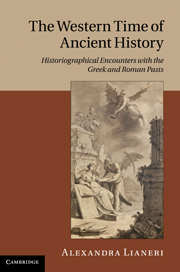Book contents
- Frontmatter
- Contents
- Acknowledgements
- Notes on contributors
- INTRODUCTION
- THEORISING WESTERN TIME: CONCEPTS AND MODELS
- 1 Time's authority
- 2 Exemplarity and anti-exemplarity in early modern Europe
- 3 Greek philosophy and Western history: A philosophy-centred temporality
- 4 Historiography and political theology: Momigliano and the end of history
- ANCIENT HISTORY AND MODERN TEMPORALITIES
- UNFOUNDING TIME IN AND THROUGH ANCIENT HISTORICAL THOUGHT
- AFTERWORD
- Bibliography
- Index
3 - Greek philosophy and Western history: A philosophy-centred temporality
from THEORISING WESTERN TIME: CONCEPTS AND MODELS
Published online by Cambridge University Press: 03 May 2011
- Frontmatter
- Contents
- Acknowledgements
- Notes on contributors
- INTRODUCTION
- THEORISING WESTERN TIME: CONCEPTS AND MODELS
- 1 Time's authority
- 2 Exemplarity and anti-exemplarity in early modern Europe
- 3 Greek philosophy and Western history: A philosophy-centred temporality
- 4 Historiography and political theology: Momigliano and the end of history
- ANCIENT HISTORY AND MODERN TEMPORALITIES
- UNFOUNDING TIME IN AND THROUGH ANCIENT HISTORICAL THOUGHT
- AFTERWORD
- Bibliography
- Index
Summary
The idea that Greek philosophy should be conceived of as one of the constituting traits of Europe and, more generally, of the west, seems to be widespread nowadays both within and outside the academic world. Influential philosophers of the last century, such as Husserl, Heidegger or Popper, have advocated this idea, despite their radically different perspectives. In the Atlas (1984) Jorge Luis Borges, who enjoyed shifting along remote times and spaces, from China to India or Iceland, expressed this widespread view with great force and clarity. In the chapter set in Greece and entitled “El Principio,” he imagines two Greek men talking – maybe Socrates and Parmenides, but names are irrelevant as are the things they are talking about. What matters is that they agree on one thing alone: “They know that discussion is the non-impossible path for reaching a truth.”
Awakening from a dream, in which he dreamt that the Encyclopaedia Britannica had entries provided with conclusions, but without beginnings, Borges had realized that he was in Greece, “… where everything has begun, if indeed things, in contrast to the entries of the encyclopaedia dreamed, have beginnings.” It is legitimate to doubt that Greece has always been regarded as the original land of philosophy, and that philosophy has been its distinctive possession and defining feature, since this has been questioned by Greeks themselves.
- Type
- Chapter
- Information
- The Western Time of Ancient HistoryHistoriographical Encounters with the Greek and Roman Pasts, pp. 60 - 98Publisher: Cambridge University PressPrint publication year: 2011

